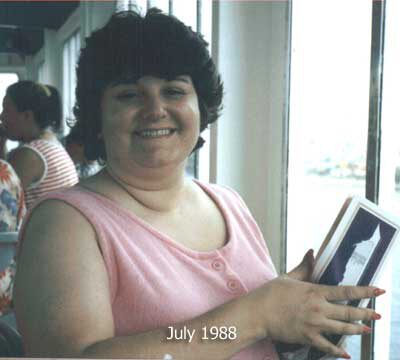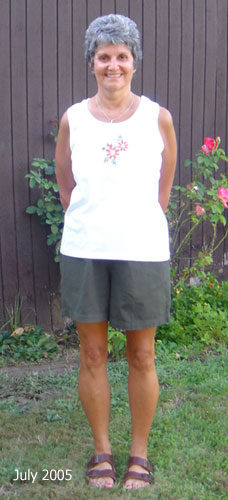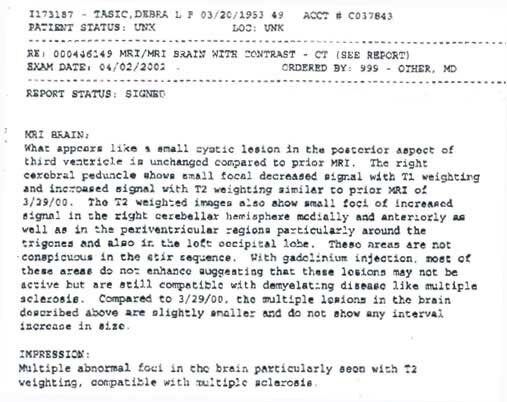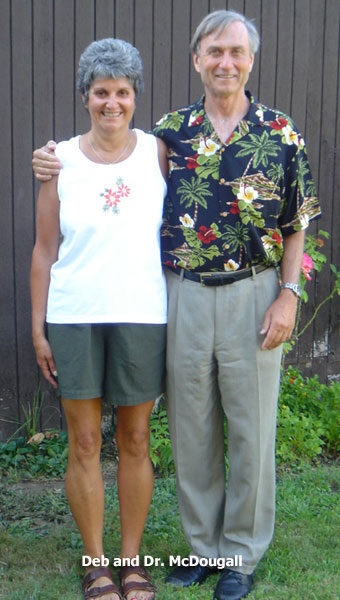Deb Tasic: Stops Multiple Sclerosis
The first attack began in the spring of 1994 with an episode of dizziness and nausea that progressed rapidly to the point where I was unable to lift my head from the pillow because the room was spinning out of control. We called our family doctor who prescribed medicine for an inner ear infection over the phone. I was too sick (& dizzy) to drive. My husband was legally blind and in a wheelchair so he was unable to take me to the doctor’s office. In spite of medications prescribed for dizziness and anxiety, I remained incapacitated. Several days later a friend drove us to our family doctor. I still remember sitting in the back seat of her car getting sicker and sicker. I tried closing my eyes to stop the spinning, but that didn’t help. I prayed that I could just get to the doctor’s office without vomiting. The doctor examined me and said he thought I should get an MRI and see a neurologist. Fear grabbed a hold of my entire body as I realized how vulnerable my husband and I were now – and at risk of losing our independence.
Several days later we sat in stunned silence in the neurologist’s office as he delivered the death sentence that would forever shadow our lives: “You have MS – Multiple Sclerosis.” Neither my husband nor I could talk. We were afraid to even look at each other. Finally, through my fog, I reluctantly asked, “MS? What’s the cure?” When he stopped shuffling through the papers in my file, he turned around to his writing board and drew a big blue “X” with his magic marker in the upper left corner. Next he placed a similar mark in the middle of the board. As he drew a downward line from the top to the middle, he said to us, while tapping on the top mark, “This is where you are now” and then he pointed to the middle “X,” and said, “This is where you’ll be in 5 years – in a wheelchair.” He then continued to draw a line to the bottom right corner where he drew the third and final “X,” and coldly proclaimed, “And this is where you’ll be in 10 years – bedridden.” It was Memorial Day weekend 1994. I was 41 years old and in relatively good health (or so I thought).

The neurologist explained that there’s no definitive test for MS, but he would schedule me for a spinal tap. Because of my husband’s brain tumors, we knew this was a risky and painful test. I asked him if that would diagnose MS. He said, “Oh no, it’s a test to eliminate other diseases. As I told you before, there is NO test to diagnose MS.” I told him I didn’t want a spinal tap. He became angry with my refusal and told me that I was being childish. He said he gave spinal taps all the time to children – and I remember thinking, “I hope with more compassion than you’re showing to me.” Then he threatened me, “If you don’t agree to a spinal tap, I won’t put your name on the list for clinical trial drugs, which is your only real hope for a cure someday.” I told him we needed time to think and as we walked out of his office and down the hall, he followed me, chastising me for being “so foolish about the spinal tap.” I knew at that point, I would never ever go to that doctor again.
I continued to have small exacerbations. I wallowed in self-pity for the next 2 years, because I could see my picture was looking as grim as the neurologist had drawn. The books on multiple sclerosis I had been reading caused me to start making long-term plans for my future care. So I made sure my home was wheelchair accessible and I enrolled in “Long Term Disability Insurance” through work during an open enrollment period – fortunately this opportunity was available because I had now become officially “uninsurable” by my diagnosis of MS. I began going to support group meetings – which I found to be as depressing as the mailings I was now receiving from the MS Society.
I started reading everything I could find on MS. Medical experts seemed to think that MS was caused either by a virus or by the unfortunate circumstance of being born in a northern latitude. (The theory is: the further you live from the equator, the likelier you are to develop MS for some mysterious reason). Neither of these conditions could I change. However, in one small paragraph in a mountain of books, I found a few short lines about the low-fat diet therapy developed by Dr. Roy Swank, a neurology professor and medical doctor from the University of Oregon Medical School. All I was hearing about diet from my doctors was to eat fiber to help with the constipation caused by damage from MS to the nerves to the bowel, and to eat lots of fat for the brain and protein for the muscles – the best sources of both of these being milk and meat.
Since I was at least 70 pounds overweight, I decided to go back to Weight Watchers. They had helped me lose 50 pounds for my 20th class reunion in 1991 – and the diet was lower in fat than I was eating. I also started walking with a friend. The first mile took us 40 minutes. But, as the weight began to come off, we walked longer in less time. Nine months later I reached my goal weight and was up to walking 6 miles a day 5 to7 times a week.
 However, I was still having small exacerbations with numbness from my MS, especially when stressed. In retrospect, my guess is that when I was stressed I’d reach for all those high fat foods, like potato chips and ice cream. But my diet was slowly improving – by 2001, I would have called myself a semi-vegetarian, because I was eating only a little chicken and shrimp. At this time I decided to attend the NAVS (North American Vegetarian Society) Summerfest where I met Dr. John McDougall – the keynote speaker. He seemed committed to getting people out of the health care system and that’s what I wanted. He wanted people off medications and supplements – I was spending over $100 a month on vitamins and other “natural” supplements. After this experience my diet was greatly improved.
However, I was still having small exacerbations with numbness from my MS, especially when stressed. In retrospect, my guess is that when I was stressed I’d reach for all those high fat foods, like potato chips and ice cream. But my diet was slowly improving – by 2001, I would have called myself a semi-vegetarian, because I was eating only a little chicken and shrimp. At this time I decided to attend the NAVS (North American Vegetarian Society) Summerfest where I met Dr. John McDougall – the keynote speaker. He seemed committed to getting people out of the health care system and that’s what I wanted. He wanted people off medications and supplements – I was spending over $100 a month on vitamins and other “natural” supplements. After this experience my diet was greatly improved.
Over the past decade, the MS has left me with some problems, like a little clumsiness due to balance issues and slight memory loss, but I am otherwise completely normal, and work full time. I have had no more exacerbations from my MS since 2001, and I am on no medications or vitamins, except for a small dose of thyroid medication. My journey has taken me from 203 to 135 pounds. My cholesterol went from 192 mg/dl to 155 mg/dl on the McDougall Program. I still walk 6 miles several times a week along with doing strength training. I look and feel very, very healthy.
Measurement of my MS activity by use of the MRI machine showed continued progression of the disease from 1994 to 2000 with an increase in the number of lesions, which looked even more typical for MS (described as “increased conspicuity”). However, after changing to a very low-fat diet the reports changed too. In April of 2002, my MRI report read, “Compared to 3/29/00, the multiple lesions in the brain described above are slightly smaller and do not show any interval increase in size.” My 2004 MRI report showed no interval MS activity – the old lesions were stable and no new ones were forming.

I just finished the July 2005, McDougall 10-day live-in program in Santa Rosa, and because of that positive experience I agreed to “come out” about my disease and to be a Star McDougaller. Dr. McDougall convinced me that the good I could do by sharing my story would far surpass any discomfort I would feel once my secret was out. I want to give a message of hope to anyone who might be sitting in a doctor’s office hearing the words, “You have MS” and the same picture of downward sloping “X’s” drawn either verbally or on a writing board. I believe a healthy diet is the answer and from what I have seen, the scientific research backs that up. Too bad everyone doesn’t know this simple truth.
For more information see Hot Topics on Multiple Sclerosis.
Dr. McDougall’s Comments:

People with multiple sclerosis are harmed by false promises from the pharmaceutical industry carried out by their well meaning physicians; and as a result, nearly 50% of MS patients are unable to walk unassisted, bedridden, wheelchair bound or dead within 10 years of diagnosis. The simple, profit-free truth is: a healthy diet can stop this disease. A hard look at the evidence will lead all but the “financially tainted” to the conclusion that the time has long passed to change the way people with MS are treated.
The Cochrane Collaboration is an international not-for-profit organization that encourages informed decisions about health care and is designed to provide realistic expectations about what a drug might do for patients. According to their reviews, medications used for multiple sclerosis are largely ineffective and in most cases outweighed by the costs and side effects.
Conclusions from Cochrane Review of Drugs Used for Multiple Sclerosis: Glatiramer (Copaxone): “Glatiramer acetate did not show any beneficial effect on the main outcome measures in MS, i.e. disease progression, and it does not substantially affect the risk of clinical relapses. Therefore its routine use in clinical practice is not currently supported.”3
Interferon: (Avonex, Betaseron, Rebif): “Recombinant interferons slightly reduce the number of patients who have exacerbations during first year of treatment. Their clinical effect beyond 1 year is uncertain and new trials are needed to assess their long-term effectiveness and side-effects.”4
The National Institute of Clinical Excellence (NICE), expressed the Appraisal Committee’s view that the “modest clinical benefit” of ß-interferon and glatiramer acetate for multiple sclerosis (MS) is outweighed by their cost (June 20, 2000).5
Corticosteroids (methylprednisolone – MP): “We found evidence favouring the corticosteroid MP for acute exacerbation in MS patients. Data are insufficient to reliably estimate effect of corticosteroids on prevention of new exacerbations and reduction of long-term disability. Studies assessing long term risk/benefit and adverse effects of corticosteroids in MS patients are urgently needed.”6
Cyclophosphamide: “This review shows a role of Cyclophosphamide in the treatment of progressive MS, but less toxic schedules must be considered, before its use in the clinical practice.”7
Additional MS Drugs not evaluated by Cochrane:
Mitoxantrone (Novantrone): Anti-cancer drug with severe toxicity (cardiac) and limited benefits for MS.8
Natalizumab: (Tysabri, Antegren): Recalled from the market on February 28, 2005 because of one fatal case and one additional case of progressive multifocal leukoencephalopathy (PML) in patients with multiple sclerosis.9
Because of the lack of any means for profit, diet therapy is almost never recommended. However, 50 years of research by Dr. Roy Swank, former head of the University of Oregon Medical School Neurology Department (for 23 years), on over 5000 patients with MS shows this disease can be stopped by a low-fat diet. His work, published in the world’s most prestigious journals, including the Lancet, shows that if someone in the early stages of MS is faithful to a low-fat diet then they have less than a 5% chance of becoming worse over the next 35 years – compare that to the 10-year record for “good medical care.”1
Click here for more information on Dr. Swank.
Dietary treatment is without side effects, cost-free and benefits all other areas of health (obesity, heart disease, diabetes, cancer, etc.) – contrast that to annual costs of nearly $20,000 per year for drugs and $50,000 for total care for the average person with MS.2
So why don’t doctors prescribe diet over drugs? The excuse I hear is that quality research using randomized controlled trials (RCT) has not been done to prove its value. (Like, what do you have to lose by recommending someone eats well?) So why haven’t such studies been done over the past 3 decades? No profits are to be made, so funding is scarce.
Based on 30 years of my experiences and the work of Dr. Swank’s, I believe Deb Tasic’s response to diet is typical. Over the past two years I have made attempts to raise $500,000 – the cost of caring for 10 people with MS for one year or one MS patient for 10 years – to start the investigation to prove diet’s benefits to the rest of the world. This means a controlled study (RCT) acceptable to the medical community that would show, using modern criteria, including MRI scans and disability evaluations performed by neurologists, the benefits of a healthy, low-fat, plant-based diet for MS. Unfortunately, the funds have been building too slowly to help the half million people with multiple sclerosis in the USA alone.
References:
1) Swank RL, Dugan BB. Effect of low saturated fat diet in early and late cases of multiple sclerosis. Lancet 1990; 336: 37-39.
2) Kobelt G. Costs and Quality of Life in Multiple Sclerosis A Cross-Sectional Study in the USA. http://ideas.repec.org/p/hhs/hastef/0594.html
3) Munari L, Lovati R, Boiko A. Therapy with glatiramer acetate for multiple sclerosis. Cochrane Database Syst Rev. 2004;(1):CD004678.
4 ) Filippini G, Munari L, Incorvaia B, Ebers GC, Polman C, D’Amico R, Rice GP. Interferons in relapsing remitting multiple sclerosis: a systematic review. Lancet. 2003 Feb 15;361(9357):545-52.
5) Clegg A, Bryant J. Immunomodulatory drugs for multiple sclerosis: a systematic review of clinical and cost effectiveness. Expert Opin Pharmacother. 2001 Apr;2(4):623-39.
6) Filippini G, Brusaferri F, Sibley WA, Citterio A, Ciucci G, Midgard R, Candelise L. Corticosteroids or ACTH for acute exacerbations in multiple sclerosis. Cochrane Database Syst Rev. 2000;(4 :CD001331.
7) La Mantia L, Milanese C, Mascoli N, Incorvaia B, D’Amico R, Weinstock-Guttman B. Cyclophosphamide for multiple sclerosis. Cochrane Database Syst Rev. 2002;(4):CD002819.
8) Goffette S, van Pesch V, Vanoverschelde JL, Morandini E, Sindic CJ. Severe delayed heart failure in three multiple sclerosis patients previously treated with mitoxantrone. J Neurol. 2005 Apr 18; [Epub ahead of print]
9) FDA Report: Link http://www.fda.gov/cder/drug/infopage/natalizumab/default.htm
Recommended Articles

Esther: Her New Life

John: Reversed His Diabetes and Beat His Family Genetics






